How to Become a Paralegal
- Quick Facts: Paralegal Salary, Education, and Outlook
- What Paralegals Do
- Key Skills and Traits for Success
- Work Settings for Paralegals
- How to Become a Paralegal
- Education and Certification Paths
- Career Growth and Advancement
- Cost and Duration of Training
- Pros and Cons
- Take the First Step Toward a Paralegal Career
Ever watched a courtroom scene and thought, "I would love to help build that case"?
Paralegals make that possible every day.
Paralegals, also called legal assistants, are essential inside law firms, corporate legal teams, and government offices. They research laws, organize evidence, prepare documents, and support attorneys before, during, and after major legal actions. If you enjoy facts, precision, and problem solving, this is a direct path into the legal field without the time or cost of law school.
Quick Facts: Paralegal Salary, Education, and Outlook
What Paralegals Do
Paralegals keep legal cases organized, documented, and moving. They gather information, prepare drafts of key documents, and support attorneys by taking on the detail heavy tasks that legal work demands. This lets attorneys focus on strategy, negotiations, and courtroom preparation.
Typical tasks include reviewing records, researching statutes, and preparing legal correspondence. Paralegals also organize discovery materials so evidence is easy to reference, maintain calendars and deadlines, schedule hearings, and communicate with clients or witnesses. Their work ensures every part of a case file is clear, accurate, and accessible when the legal team needs it.
Typical Responsibilities
- Research laws, case precedents, and regulations
- Draft legal documents and contracts
- Organize discovery materials and trial exhibits
- Interview clients and witnesses
- Track case deadlines, filings, and court requirements
Paralegals form the organizational backbone of a law office. Their work keeps cases on track and fully documented.
Key Skills and Traits for Success
- Strong legal writing and research skills
- Attention to detail and organized workflow
- Ability to manage several cases at once
- Professional ethics and confidentiality
- Comfort with legal software and databases
- Clear, confident communication
Work Settings for Paralegals
Paralegals can work in many environments including:
- Law firms in areas like litigation, family law, criminal law, or corporate law
- Corporate legal departments
- Government agencies and court systems
- Nonprofit organizations
- Real estate and financial institutions
How to Become a Paralegal
Most people prepare for the field within one to two years, depending on their education path.
1. Earn a High School Diploma or GED
Strong writing and civics classes help build a foundation for later legal coursework.
2. Complete a Paralegal Studies Program
Common options include:
- Certificate programs that take six to twelve months. Popular with adults changing careers.
- Associate degree programs that take about two years. This is the most common route into the field.
Coursework usually includes legal research, litigation, contracts, and ethics.
3. Gain Practical Experience
Internships or entry level roles provide hands on training and exposure to real cases.
4. Consider Certification
Certification can improve professional credibility. Common options include:
- Certified Paralegal (CP) from NALA
- Registered Paralegal (RP or CRP) from NFPA
- Professional Paralegal (PP) from NALS
5. Apply for Paralegal Roles
Law offices, corporations, and government agencies hire paralegals for a wide range of duties. Strong writing samples and research projects help demonstrate ability.
Education and Certification Paths
| Pathway | Typical Duration | Outcome |
|---|---|---|
| Certificate | 6 to 12 months | Entry level preparation |
| Associate Degree | 2 years | Most common credential |
| Bachelor's Degree | 4 years | Helpful for advanced or corporate roles |
| Post Baccalaureate Certificate | 6 to 12 months | Ideal for career changers |
Career Growth and Advancement
With experience, paralegals may move into roles such as:
- Senior Paralegal who mentors newer staff and manages complex cases
- Legal Analyst or Compliance Officer for corporate environments
- Paralegal Manager who oversees teams and workflows
- Law Student or J.D. Candidate for those who later choose to pursue law school
Cost and Duration of Training
- Program cost: often ranges from about $4,000 to $15,000 depending on format and school
- Time to complete: six months to two years
- Certification exam fees: generally around $150 to $300
Many paralegal programs are available online, which helps students learn at a flexible pace.
Pros and Cons
Take the First Step Toward a Paralegal Career
If you are organized, analytical, and interested in the legal system, a paralegal career offers a respected way to work inside law without the years of law school.
Start Your Paralegal Training Today

Paralegal Salary by State

Meet the author: Brad Fishbein is a Florida Licensed Mold Assessor and council-certified Microbial Investigator. He’s the founder of TradeCareerPath.com and has completed over 5,000 mold inspections since 2009. Brad now helps homeowners and tradespeople make smart decisions about mold, licensing, and skilled career paths.
Notice an update we should make?
We strive for accuracy. Contact us here if you see incorrect or outdated info on this page.